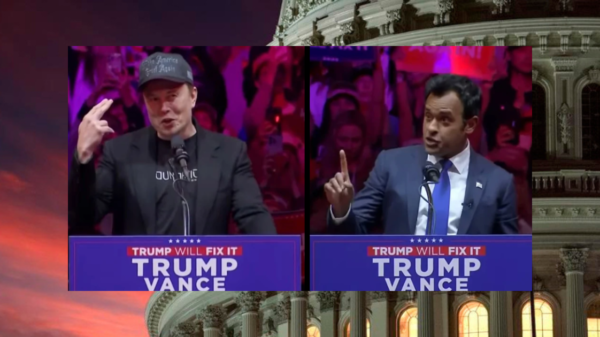Limited to 90-second answers in last week’s debate, Chris Christie held forth at length Wednesday, critiquing his Republican rivals as “fundamentally unserious” before condemning the emerging foreign policy consensus of the political party he seeks to lead for its “head-in-the-sand isolationism.”
Christie returned Monday from a trip to Israel to see the aftermath of the Oct. 7 Hamas attack, and at the Hudson Institute in Washington, the former New Jersey governor argued that “a world increasingly falling into chaos” was a result of “the lack of American leadership.”
He placed the blame at the feet of the last two men who lived in the White House just blocks away.
“Donald Trump’s foreign policy is reminiscent of the 1930s,” he said. “But Joe Biden’s feels like that in the 1970s.”
In Christie’s telling, Biden has been too “timid and weak” in the face of aggression around the globe, first with the disastrous withdrawal from Afghanistan, followed by the Russian invasion of Ukraine, and finally now the crisis in the Middle East. Never one to miss an opportunity to criticize Trump, Christie added that Biden’s predecessor spent his four years in office “undermining our closest friends around the world while also sending an open invitation to our enemies to be aggressive.”
It is the latest salvo from Christie, who has spent much of the last three years offering a sort of public penance. He was once friends with Trump, advising him during his time in office before ultimately turning against him. Supporting the populist president, Christie now says, was “a mistake.” And his current mission, as he seeks the 2024 Republican presidential nomination, seems to be, in part, tearing up the new foreign policy that Trump planted deep within the ranks of the GOP.
More prominent candidates have successfully elbowed Christie out of the limelight thus far. He has been somewhat muted on each of the previous debate stages. He took no prisoners during remarks at the conservative think tank, however, scorching the field one by one. More polite politicians, Christie told the crowd, would not use names that would be seen as rude.
“Well, I’m from New Jersey,” he said. “So, we’re not worried about being discourteous. We’re born that way.” He then fired his most comprehensive broadside to date: The rest of the field, according to Christie, was a ship of fools.
He accused Ron DeSantis of pandering for TV with “tough guy talk” that “he learned from his mentor, Donald Trump.”
“DeSantis thinks he sounds tough by saying he’s gonna slit the throats of bureaucrats or shoot immigrants stone-cold dead at the border and use the United States army to invade Mexico,” Christie said in an apparent reference to the Florida governor’s vow to use deadly force against drug smugglers.
He slammed Trump for using language “acquainted with the worst of Nazi Germany” when the former president compared his domestic political enemies to “vermin.”
“When Nikki Haley believes that just saying over and over again, ‘finish them,’ in regard to Hamas is a foreign policy, she can’t be taken seriously,” Christie continued, adding that the former ambassador to the United Nations needed to provide “the next four sentences after that.”
“And when Vivek says that our goal in Ukraine should be for Putin not to lose, it seems to me that’s someone who is not fit for American business, let alone American leadership,” he said of Vivek Ramaswamy, the 38-year-old entrepreneur-turned-politician.
Christie said that all of them were “fundamentally unserious.” None, except for Ramaswamy, returned RealClearPolitics’ request for comment. He shot back with a reference to “Bridgegate,” telling RCP that “Christie’s version of ‘foreign policy experience’ is blockading a bridge from New Jersey to New York.” Regardless, the former governor promises he will see all of them in person, minus Trump, next month.
“I have already qualified for the fourth debate,” Christie said of the Republican National Convention’s requirement that candidates receive support from 80,000 donors and poll above 6 percent in two national polls. Despite clearing that threshold, the former governor remains in last place. He insists he is best positioned to take on Trump. It may be true temperamentally, but the voters aren’t yet on board. Christie stands at just 2.5 percent in the RCP Average.
“This is a fallacy of the campaign. I have people ask me all the time, how are you going to get votes from the Trump base,” he said. “I’m not. I’m not trying to – his base is about 25 percent of our party. You want me to go fish in the 25 percent pond? I’d rather fish in the 75 percent pond.”
While in pursuit of a majority in this country, Christie is the sole candidate who has traveled to two war zones. He discussed in detail what he saw in Israel, condemning those who now call for a ceasefire and noting that there was such a ceasefire “until Hamas broke it,” and he relayed “two messages” from Ukrainian President Zelensky, whom he met with in August.
According to Christie, the first was “Thank you – he said that without American help, Ukraine would now be occupied by Russia.” The second, just like Ukraine doesn’t want to be occupied by Russians, “we don’t want to be occupied by you either. Just give us the weapons.”
The governor made a quick calculation: The United States has provided aid worth “less than 4%” of the Pentagon’s annual budget, and the Russian military capability has been “degraded 50%.” Christie said that this seemed “a pretty good return on investment for us, and one that we should double down on.”
The conflict in Europe has devolved into stagnant trench warfare, with Ukrainian military leaders publicly admitting that their counteroffensive has slowed and “there will most likely be no deep and beautiful breakthrough.” For his part, Trump insists he could end the fighting in “less than 24 hours,” a boast that Christie warns means the former president “will just turn Ukraine over lock-stock-and-barrel to his brilliant, as he calls him, friend, Vladimir Putin.”
How would a Christie administration define victory? He told RCP that victory “at a minimum” would mean returning Ukraine’s borders to where they were before the Russian invasion. “Whether you go back beyond that,” he said of a potential Ukrainian advance, “and what level of support we give for anything beyond that, would have to be the subject of negotiations between us and the Ukrainians.”
“Our moral position has to be that the 2022 invasion was immoral, violative of international law, and unjust,” he continued. “We can’t allow them to keep land that they seized that way because we do that, and we give license to every other dictator in the world to take what they want.”
A partisan brawler capable of mixing it up with the best of them, Christie called on Washington to set its sights beyond the usual infighting. “We do not need smallness from our leaders continuing to divide us into smaller and smaller groups and pitting us against each other,” he said on stage. Once just a nuisance, with conflict abroad, he warned, “that smallness is now dangerous.”
“So, in this moment of global turmoil, we cannot afford to hand power to those people who think that wielding it is a game – that it can be taught by political consultants, who tell them how to come up with a line at a debate that might get applause from some stupid people in the audience,” he added.
“The fight for freedom in Ukraine and the fight for security and survival of Israel come as the world’s most menacing, authoritarian regimes are drawn closer together,” he concluded.
This article was originally published by RealClearPolitics and made available via RealClearWire.


















